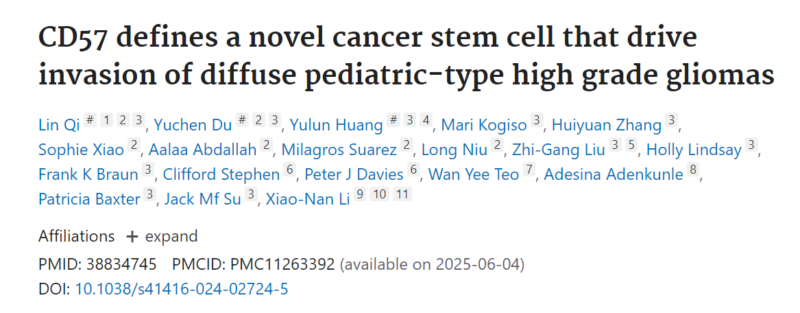Susanna F. Greer shared on LinkedIn:
“Cracking the Code of Aggressive Pediatric Brain Tumors.
High-grade gliomas (HGG) are among the most aggressive types of pediatric brain tumors. These tumors are known for their ability to spread deep into the brain, making them incredibly difficult to treat. Even after surgery or chemotherapy, glioma cells often come back, invading healthy brain tissue like an army of intruders. Researchers have long been puzzled by how some of these cells are able to spread so easily, while others stay contained. A big question is: what makes these invasive cells so powerful, and how can we stop them?
In this study from the V Foundation grantee Dr. Xiao-Nan Li, Northwestern University – The Feinberg School of Medicine, Dr. Li and colleagues zeroed in on a particular group of cells that seem to be the “ringleaders” of tumor invasion. These cells are ‘marked’ by a protein called CD57.
Think of a tumor as a city under siege. Inside the city are many different types of soldiers (cancer cells), and some are much more dangerous than others. Some of these soldiers (cancer cells) are stronger and better equipped to break through the walls of the city and invade new areas. The Li Lab discovered that CD57 is like a special uniform worn by the most aggressive soldiers in this invading army. When cells have the CD57 uniform on, it signals that they are the ones leading the charge into healthy brain tissue.
On the other hand, other cells in the tumor are marked with a different protein called CD133. These CD133-positive cells were previously thought to be the most dangerous ones, like elite soldiers with specialized training. But what Dr. Li found is that while CD133-positive cells can be tough, it’s really the CD57-positive cells – especially those that don’t have CD133 – that are the ones doing the most damage by spreading into new areas of the brain.
A huge part of their discovery is tied to where these cells are located within the tumor. Imagine the tumor as a battlefield. The cells that are closest to the edges of the battlefield – the ‘invasive front’ – are like scouts leading the charge, trying to break into new territory (healthy brain tissue). The Li lab discovered that CD57-positive cells found at this invasive front were much more aggressive than similar cells found deeper inside the tumor.
The real breakthrough here is that Dr. Li has identified CD57 as a ‘marker’ for these especially dangerous tumor cells. It’s like a flag that shows, ‘Hey, this is the cell we’re looking for.’ By using CD57 as a marker, doctors can better identify which cells in the tumor are driving its spread. This is a major finding because it suggests that future treatments could focus on specifically targeting these CD57-positive cells to prevent the cancer from spreading.
The idea that certain cells within a tumor are more dangerous than others is a game-changer. It means that instead of treating all the cells in a tumor the same way, researchers might be able to develop therapies that specifically go after the worst offenders – in this case, the CD57-positive cells. Think of it like trying to stop an invasion: if you can identify and neutralize the leaders of the attack, the rest of the army becomes less effective. More research is needed to fully understand how these cells operate and how they can be stopped. But this discovery represents a promising step toward finding better, more targeted treatments for this deadly type of brain cancer. Way to go Li lab – keep up the good work.
Find Dr. Li’s lab and their paper.”
Authors: Lin Qi, Yuchen Du, Yulun Huang, Mari Kogiso, Huiyuan Zhang, Sophie Xiao, Aalaa Abdallah, Milagros Suarez, Long Niu, Zhi-Gang Liu, Holly Lindsay, Frank K Braun, Clifford Stephen, Peter J Davies, Wan Yee Teo, Adesina Adenkunle, Patricia Baxter, Jack Mf Su, Xiao-Nan Li

Source: Susanna F. Greer/LinkedIn
More posts featuring Susanna F. Greer on oncodaily.com
Susanna F. Greer is the Chief Scientific Officer at the V Foundation. Before this role, Dr. Greer was a Senior Scientific Director at the American Cancer Society, where she led the Biochemistry and Immunology of Cancer Research Program. Greer’s work focuses on identifying crucial signaling pathways in the immune response to cancer and has led to significant discoveries in molecular immunology and new epigenetic targets.


